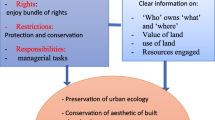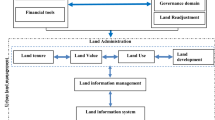Abstract
Public urban lands significantly benefit the people, environment, and economy and demand protection and proper management from people. However, unauthorized encroachment and occupation of public lands by Burundians have posed a significant threat to the sustainability of public lands. Understanding legal and policy responses and their coherence are critical for long-term public urban land management. Therefore, this paper aims to examine the coherency and ambiguity in the existing legal and policy frameworks vis -à- vis the management of public urban lands in Burundi. The such policy-level analysis could help to scrutinize the areas of policy intervention to improve the management of public urban lands. Qualitative research was applied. Data were collected from desk reviews, key informant interviews, and focus group discussions. A Common Analytical Framework was used to evaluate the effectiveness of the different land-related policies. The evaluation is made based on three criteria: the content of each policy, governance of the policy under evaluation, and policy linkage to land management. The findings reveal that public urban land issues are fragmentally found in different policies and consequently are ineffectively managed by various institutions. This paper recommends the need for mainstreaming of public urban land in the land management programmes as well as harmonization of policy frameworks to effectively deal with public urban lands in Burundi.
Similar content being viewed by others
Notes
For details cf. Research Materials and methods and Analytical Frameworks section (p.9).
Policy orientation reflects the intention and goals i.e. how the policy controls the impact of practices on resources such as resource management and conservation, production system, social aspects, and development perspective of the region or country.
Governance of policy indicates actors, objects, strategies, rules, and instruments useful to implement policies.
This is the level of appropriation i.e. at what level the policy is negotiated or formulated, implemented, what is the conception of land in general view.
A kind of land tenure system that is exploitative through feudal bondage. Land to the tiller became an adage for many revolutionists in Asia and Africa (Ethiopia in 1965) that wanted to abolish landlord tenants’ relationships.
It is a French abbreviation that can be translated as Strategic plan for development and poverty eradication.
References
African Union. (2009a). Declaration on land issues and challenges in Africa, Assembly/AU/Decl.1(XIII) Rev.1. Addis Ababa, Ethiopia: African Union.
African Union. (2009b). Framework and guidelines on land policy in africa land Policy in Africa: a framework to strengthen land rights, enhance productivity and secure livelihoods.
African Union. (2010). Frameworks and guidelines on land policy in Africa: Land Policy in Africa: A Framework to Strengthen Land Rights, Enhance Productivity and Secure Livelihoods. Addis Ababa, Ethiopia: ECA Publications and Conference Management Section (PCMS).
Adam, A. G., Cikara, A. M., Kayuza, H., Wabineno, L. M., Jossam, P., Turimubumwe, P., Wayumba, R., & Zevenbergen, J. (2020). Land governance arrangements in eastern africa: description and comparison. African Journal on Land Policy and Geospatial Sciences, 3(2), 53–68.
Alberti, M. (2008). Advances in urban ecology: integrating humans and ecological processes in urban ecosystems (éd. 1). Washington, USA: Springer.
Alig, J., Kline, D. J., & Lichtenstein, M. (2004). Urbanization on the US Landscape: Looking ahead in the 21st century. Landscape and Urban Planning, 69(2004), 2019–2234.
Allas, T., Bravo-Biosca, A., Phipps, J., Hart, M., Laatsit, M., Roper, S., & Analysts. (2018). Evaluation framework: how we assess our impact on business and the economy. London, UK.
Arnstein, R. S. (1969). A Ladder of Citizen Participation. Journal of the American Planning Association, 35(4), 216–224.
Azadi, H., & Vanhaute, E. (2019). Mutual effects of land distribution and economic development: evidence from Asia, Africa, and latin America. Land, 8(96), 1–15. https://doi.org/10.3390/land8060096
Azous, L. A., & Horner, R. R. (2001). Wetland and urbanisation: implication for the future (éd. 1st). Washington, DC: CRC Press LLC.
Bambio, Y., & Agha, B. (2018). Land tenure security and investment: Does the strength of land right really matter in rural Burkina Faso? World Development, 111, 130–147.
Bernard, H. R. (2002). Research methods in anthropology: Qualitative and quantitative approaches (éd. 3rd). Walnut Creek, CA: Alta Mira Press.
Bonin, M., Coudel, E., Cissé, Y., Feng, S., Gicheru, P., Novira, N., Tonneau, J. P. (2012). Critical analysis of land use policies. Dans D. McNeill, I. Nesheim, & F. Brouwer (Éds.), Land Use policies for sustainable development: exploring integrated assessment approaches (pp. 248–281). Cheshire, UK: Edward Elgar Publishing Limited.
Coline, P., & Brigitte, N. (2022). An analytical framework to consider social justice issues in farmland preservation on the Urban Fringe. insights from three French cases. Journal of Rural Studies, 93, 122–133. https://doi.org/10.1016/j.jrurstud.2020.07.007
Commission of the European Communities. (2004). European Union Guidelines to support land policy design and reform processes in developing countries. In Communication from the Commission to the Council and the European Parliament.
European Commission. (1999). MEANS collection - Evaluating socio-economic programs. Luxembourg: official publications office of the European communities
Cracknell, B. E. (2000). Evaluating development aid – issues, problems, and solutions (éd. 1st). New Delhi, London: SAGE Publications.
Deininger, K. (2003). Land policies for growth and poverty reduction. Washington D.C: Oxford University Press.
Des, G. (2006). Policy Evaluation: From managerialism and econocracy to a governance perspective. Dans S. H. A., & Z. H. (Éds.), Handbook of International Development Governance, Prefinal version of Chapter 37 (pp. 655–70). New York: Taylor & Francis.
Dilshad, M. R., & Latif, I. M. (2013). Focus group interview as a tool for qualitative research: analysis. Pakistan Journal of Social Sciences (PJSS), 33(1), 191–198.
Elo, S., Kääriäine, M., Kanste, O., Pölkki, T., Utriainen, K., & Kyngäs, H. (2014). Qualitative content analysis: a focus on trustworthiness. SAGE Open, 4(1), 1–10. https://doi.org/10.1177/2158244014522633
Etikan, I. (2016). Comparison of convenience sampling and purposive sampling. American Journal of Theoretical and Applied Statistics, 5(1), 1. https://doi.org/10.11648/j.ajtas.20160501.11
Government of Congo-Brazzaville. (2000). Régime de la propriété foncière, Pub. L. No. 1, 1.
Government of Tanzania. (1997). National Land Policy. Dar es Salaam: The Ministry of Lands and Human Settlements.
Government of Ghana. (1999). National Land Policy. Accra: Ministry of Lands and Forestry.
Government of Rwanda. (2004a). National Land Policy. Kigali: Ministry of Lands, Environment, Forests, Water, and Mines.
Government of Rwanda. (2004b). National Land Policy. Kigali: GoR.
Government of South Africa. (1997). White paper on South African Land Policy April 1997. https://www.gov.za/sites/default/files/gcis_document/201411/whitepaperlandreform.pdf.
Government of Uganda. (2013). The Uganda National Land Policy. Kampala: Gov.U.
Hardin, G. (1968). The tragedy of the commons: the population problem has no technical solution; it requires a fundamental extension in morality. Science, 162(3859), 1243–1248. https://doi.org/10.1126/science.162.3859.1243
Helming, K., Diehl, K., Kuhlman, T., Jansson, T., Verburg, P. H., Bakker, M., Perez-Soba, M., Jones, L., Verkerk, P. J., Tabbush, P., Morris, J. B., Drillet, Z., Farrington, J., LeMouël, P., Zagame, P., Stuczynski, T., Siebielec, G., Sieber, S., & Wiggering, H. (2011). ante-ante impact assessment of policies affecting Land use, Part B: Application of the analytical Framework. Ecology and Society, 16(1), 1–23. https://doi.org/10.5751/ES-03840-160129
Kellman, S. (2006). “Policy evaluation: tools to improve government and/or to Shrink It? Harvard: International symposium on policy evaluation.
Krippendorff, K. (2004). Content analysis: An introduction to its methodology (2nd ed.). Thousand (éd. 2nd). Thousand Oaks, CA: Sage.
Mayer, I. S., Van Daalen, C. E., & Bots, P. W. G. (2004). Perspectives on policy analyses: a framework for understanding and design. International Journal of Technology, Policy, and Management, 4(2), 169–191. https://doi.org/10.1504/IJTPM.2004.004819
Melbourne City Council, M. (2003). Road encroachment operational guidelines. Road Encroachment Policy, 01 June, pp. 1–42.
Mihaylo, M. (2018). Guide to. Policy Analysis. https://doi.org/10.2816/60610
Mishra, L. (2016). Focus group discussion in qualitative research. TechnoLEARN, 6(1), 1–5.
van der Molen, P. (2002). Land Administration Theory: Thinking in terms of migration of systems. FIG XXII International Congress.
Mowoe, M. (2019). Land Policies in Africa: A Case Study of Nigeria and Zambia. In A. O. Akinola & H. Wissink (Eds.), Trajectory of Land Reform in Post-Colonial African States: The Quest for Sustainable Development and Utilization (pp. 75–90). Cham: Springer International Publishing. https://doi.org/10.1007/978-3-319-78701-5_6
Nyumba, O. T., Wilson, K., Derrick, J. C., & Mukherjee, N. (2018). The use of focus group discussion methodology: insights from two decades of application in conservation. Methods Ecology and Evolution, 9(1), 20–32. https://doi.org/10.1111/2041-210X.12860
O’Riordan, T., & Jordan, A. (1999). Institutions, climate change and cultural theory: towards a common analytical framework. Global Environmental Change, 9(2), 81–93. https://doi.org/10.1016/S0959-3780(98)00030-2
organisation for economic cooperation and development (OECD). (2017). the governance of land use: policy highlights. OECD Publications.
Platt, H. (2014). Land Use and Society: Geography, Law, and Public Policy (3rd ed.). Island Press.
Quizon, A. (2013). Land governance in asia: understanding the debates on land tenure rights and land reforms in the asian context; framing the debate series, No. 3; Rome, Italy: ILC.
Ramankutty, N., & Coomes, O. T. (2016). Land-use regime shifts: An analytical framework and agenda for future land use research. Ecology and Society, 21(2), 1. https://doi.org/10.5751/ES-08370-210201
Ruben, R., Moll, H., & Kuyvenhoven, A. (1998). Integrating agricultural research and policy analysis: Analytical framework and policy applications for bio-economic modeling. Agricultural Systems, 58(3), 331–349. https://doi.org/10.1016/S0308-521X(98)00034-1
Ruzzene, A. (2015). Policy-making in developing countries: From prediction to planning. Journal of Economic Methodology, 22(3), 264–279. https://doi.org/10.1080/1350178X.2015.1071511
Şatir, S., & Korkmaz, E. (2005). Urban open spaces with examples and the classification of urban furniture. Urban Design Department, 2(1/2), 130–141.
Schouwstra, M., & Ellman, M. (2006). A new explanatory model for policy analysis and evaluation, tinbergen institute discussion paper. rotterdam: Tinbergen Institute.
SDC. (2000). External Evaluation - Part 1. Working Instruments for planning, evaluation, monitoring, and transference into Action (PEMT). Vienna: Swiss Agency for Development and cooperation.
Sina Shahab, J., Clinch, P., & O’Neill, E. (2019). Impact-based planning evaluation: advancing normative criteria for policy analysis. Environment and Planning b: Urban Analytics and City Science, 46(3), 534–550. https://doi.org/10.1177/2399808317720446
Vos, J., Boelens, R., Venot, J. P., & Kuper, M. (2020). Rooted water collectives: Towards an analytical framework. Ecological Economics, 173(106651), 1–11. https://doi.org/10.1016/j.ecolecon.2020.106651
White, M. D., & Marsh, E. E. (2006). Content analysis : A flexible methodology content analysis : A flexible methodology. Library Trends, 55(1), 22–45. https://doi.org/10.1353/lib.2006.0053.
Woolley, H., Sian, R., Carmona, M., & Freedman, J. (2003). The value of public space how high quality parks and public spaces create economic, social and environmental value. Bartlett School of Planning, London.
Young, J. (2005). Research, policy, and practice: Why developing countries are different. International Development, 17(5), 727–734. https://doi.org/10.1002/jid.1235
Acknowledgements
The authors extend thanks to land officers, local leaders, and other experts who contributed to this paper as participants during data collection. Furthermore, the authors are grateful to households who generously provided data and shared their information in the case study area.
Author information
Authors and Affiliations
Corresponding author
Ethics declarations
Conflict of interest
The authors acknowledge the support of the German Academic Exchange Service in-Country/in-Region Scholarship Programme as an In-Region scholarship holder.
Informed consent
Informed consent was obtained from all individual participants included in the study.
Ethical approval
All procedures performed in studies involving human participants were in accordance with the ethical standards of the institutional and/or national research committee and with the 1964 Helsinki declaration and its later amendments or comparable ethical standards. All applicable international, national, and/or institutional guidelines for the care and use of animals were followed.
Additional information
Publisher's Note
Springer Nature remains neutral with regard to jurisdictional claims in published maps and institutional affiliations.
Rights and permissions
Springer Nature or its licensor (e.g. a society or other partner) holds exclusive rights to this article under a publishing agreement with the author(s) or other rightsholder(s); author self-archiving of the accepted manuscript version of this article is solely governed by the terms of such publishing agreement and applicable law.
About this article
Cite this article
Turimubumwe, P., Adam, A.G. & Alemie, B.K. Policy level analysis of public urban lands management in Burundi: insights for harmonization of policy frameworks. GeoJournal 88, 3223–3237 (2023). https://doi.org/10.1007/s10708-022-10801-6
Accepted:
Published:
Issue Date:
DOI: https://doi.org/10.1007/s10708-022-10801-6




